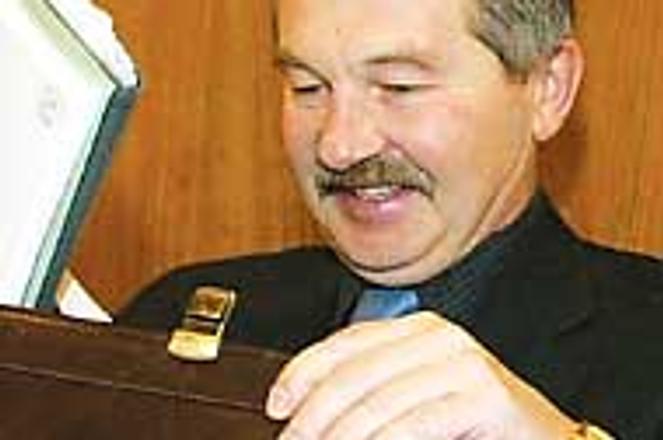PACKING HIS BAGS: Mitro calls it a day at scandal-ridden secret service.photo: SME
THE HEAD of the Slovak Information Service (SIS), Vladimír Mitro, resigned on March 11, after one scandal too many had politicians demanding his recall.
Mitro announced his plans to leave office on the day the ruling coalition was set to debate a proposal calling for the secret-service chief to be replaced, put forward by the Christian Democratic Movement (KDH) and the Hungarian Coalition Party (SMK).
"Even though I'm not a politician, I can read politics and I can no longer look at the turbulence that has prevented the SIS from doing its work. I feel my resignation is also in the interest of stability on the political scene," Mitro said in a statement issued after he stepped down.
"The fact that some government politicians despise me is a normal thing. But I feel sorry that when they could find nothing against me, certain groups in the background presented lies to the public [to get me out of office]," Mitro said.
The SMK and KDH demanded the withdrawal of Mitro after he decided to appoint former journalist Peter Tóth as the head of counterintelligence at the SIS.
The parties' objection to the appointment stemmed from a fax allegedly sent by Tóth that accused Interior Minister and KDH vice-chairman Vladimír Palko of manipulating the database of tapped phone calls at the Interior Ministry.
In response to the fax, Palko launched a complaint for libel and defamation. Criminal charges against Tóth ensued, and his involvement in the tapping scandal and the faxed accusations are currently under investigation. Tóth denies the charges.
Although Tóth's appointment to the senior SIS position was announced on February 26 and he was not charged until March 3, the KDH said that people under suspicion of attacking a member of the government should not hold high positions in the secret service.
"Steps that Mitro has taken with regard to appointing Peter Tóth [were] wrong and harmful to the reputation of the SIS," said speaker of parliament and KDH boss Pavol Hrušovský.
The Tóth affair blew up against a backdrop of scandals surrounding the SIS. The first caught the public's notice in January, after New Citizen's Alliance (ANO) party boss Pavol Rusko said he received a recording of a telephone conversation he had with a journalist from the daily SME.
The recording was later found in the tapping system that the Interior Ministry shares with the SIS. Minister Palko said that the SIS had more control than his ministry over the functioning of the tapping equipment, and that he did not know how the recording got there.
Despite several meetings, the SIS and the Interior Ministry were unable to determine how the recordings were made. Neither could they agree on who had access to the device.
"The Interior Ministry does not have control over all components of the system and does not administer it. The SIS is the administrator. I don't want to comment on the fact that Mitro says something else," said Palko.
However, this was only the first in a series of phone-tapping scandals. On February 14, several politicians and media organisations received what appeared to be the transcripts of phone conversations made by entrepreneur Ján Badžgoň in October 2002.
One showed Badžgoň talking about a Swiss bank account with Gabriel Palacka, former transport minister and member of Prime Minister Mikuláš Dzurinda's Slovak Democratic and Christian Union (SDKÚ).
Neither the authenticity nor the origin of those documents has been established, but they led some to conclude that the ruling SDKÚ was corrupt. The case is being investigated by the same team as is investigating the Rusko phone-tapping case.
The leader of the opposition Movement for a Democratic Slovakia (HZDS), Vladimír Mečiar, joined the phone-tapping debate on March 9.
"If someone tells me today that it's not possible to order the recordings of competitor from the secret service, I'll laugh in his face, because I have seen such recordings myself," Mečiar said in a debate aired by Slovak Television.
The SIS responded by opening an investigation into who might be responsible, and proposed that Mečiar be called as the main witness.
The SIS has also had to face serious allegations from abroad in recent weeks. The British magazine Jane's Intelligence Digest published reports earlier this year alleging that the SIS was involved in illegal arms trading.
These were followed in early March by reports that the SIS uses its electronic radar system to monitor the activities of certain people, including top politicians, and has information that could compromise PM Dzurinda himself.
"If [these allegations] were true, it would be a disgrace. It would cause much worry and concern at the time of Slovakia's entry into NATO," said NATO secretary general George Robertson during his visit to Slovakia on March 10.
As the scandals multiplied, most politicians seem relieved that Mitro decided to go before he was pushed.
"With this decision, Mitro has made the coalition's work easier, and I appreciate that," said SMK boss Béla Bugár.
It is not yet known who will take over at the helm of the SIS, but officials hope to appoint Mitro's successor by the end of March.

